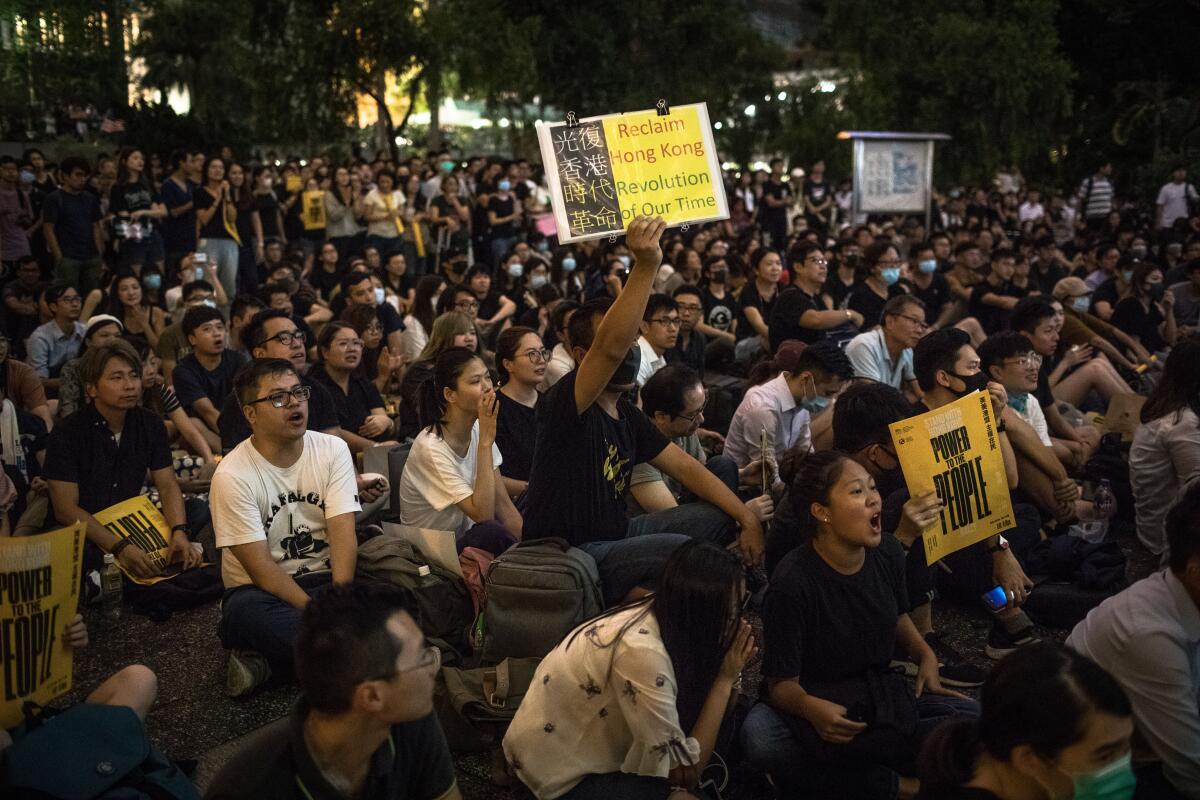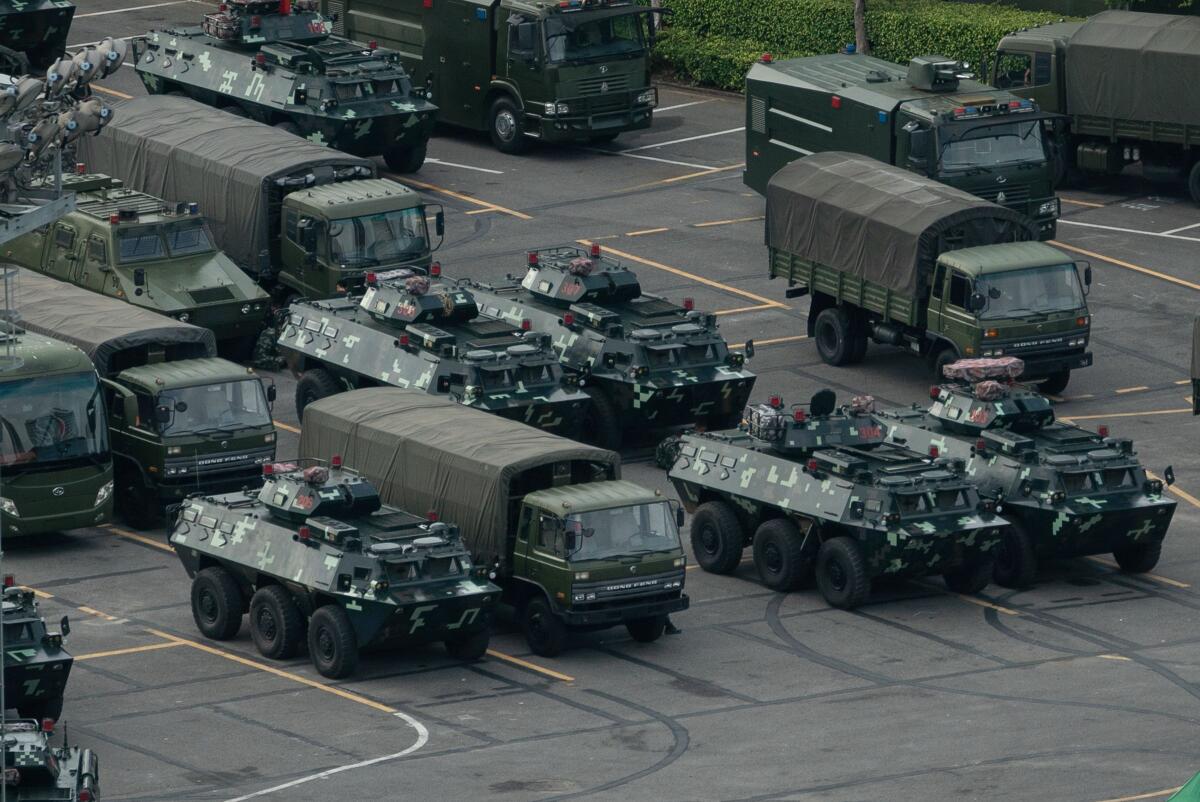What if China sends paramilitary forces to crush the Hong Kong protests?

- Share via
BEIJING — China’s massing of armed personnel carriers and paramilitary anti-terrorist police near Hong Kong’s border is supposed to send a tough warning to protesters to go home. But that doesn’t mean China wants to intervene.
The point of the massive saber-rattling display may be to scare Hong Kong protesters so much that China does not actually have to send in forces.
“My feeling is they’re trying to raise the specter of direct military intervention in Hong Kong, so as not to have to actually do it,” said Ben Bland, a Hong Kong expert with the Sydney-based independent think tank the Lowy Institute. “They’re trying to scare off protesters by implying that they’re ready to send in the People’s Liberation Army or to take other forms of direct intervention with the hope that that’s enough to force people to back down.”
Hu Xijin, editor of the Communist Party-owned Chinese daily Global Times, says the troop movements in southern China are a “clear warning” to protesters and that the chances of Chinese intervention are rising.

China has reason to hesitate before sending in forces from the mainland: Doing so could break Hong Kong, a semiautonomous territory.
But if Beijing’s threats fail to deter protesters who shut down Hong Kong’s airport this week and paralyzed the city’s transportation system a week earlier, Chinese President Xi Jinping is not likely to accept a compromise that could encourage future political demands from the city’s nimble and aggressive protest movement.
An intervention would change Hong Kong forever, undermining the civil rights guaranteed by China when it took Hong Kong back from Britain in 1997, including freedom of speech, the right to protest, an independent judiciary and freedom of the press. It would mark an end to Beijing’s already questionable narrative that Hong Kong has a “high level of autonomy,” which is supposed to be central to Beijing’s “one country, two systems” model for Hong Kong.
A large-scale Chinese paramilitary operation to crush protests would risk high civilian casualties in an echo of the 1989 Tiananmen Square massacre 30 years ago when the People’s Liberation Army fired on pro-democracy protesters in Beijing and rolled over them with tanks.
China can only intervene if Hong Kong’s government requests it — and this would not be popular with Hong Kongers, who are deeply protective of their rights. The move could drive more support to the protest movement, harden opposition against the Hong Kong administration and potentially trigger a pro-independence insurgency, the polar opposite of what Beijing wants to see.
“You can lock these guys up, but how are you going to win people over in Hong Kong?”
— Ben Bland, Hong Kong expert, Lowy Institute
The financial and economic fallout could also be severe. The economy, already teetering on the brink of recession, could collapse. Stocks likely would plummet, highly mobile capital might flee, many companies might relocate and Hong Kong could lose its position as one of the world’s top financial markets.
Even the pro-Beijing camp in Hong Kong does not favor Chinese intervention, according to analysts.
“They don’t want Hong Kong to become just another city in China,” said Bland.
Depending on casualties, Chinese intervention could trigger foreign sanctions. It could see the U.S. end Hong Kong’s special status, no longer treating it as a separate customs zone from China for the purposes of trade. For Hong Kong’s economy, heavily dependent on U.S., this would be a devastating blow.
In recent years the U.S. has questioned whether China’s steady encroachment on Hong Kong merits a review of its special status, but has so far concluded the city retains enough autonomy.
“What’s becoming increasingly clear in the last weeks and months is the Hong Kong government has extremely little autonomy when it comes to the major issues,” said Bland. “That’s been exposed now. Even if the protests die down, people understand now this is a very different Hong Kong.”
Chinese sovereignty over Hong Kong is a red line for the Chinese government, core to the Chinese Communist Party’s sense of legitimacy. Xi knows he cannot afford to look weak when it comes to confronting the protests.
As the party dials up nationalist propaganda condemning the protesters, the demand in China for tough action is becoming more strident.
“Beijing doesn’t want to see Tiananmen-style bloodshed. I don’t think it’s inevitable. The situation on the ground is very fluid.”
— Adam Ni, China analyst at Macquarie University, Sydney
Xi, however, has to weigh the risks — political, diplomatic and economic — of sending in forces.
Adam Ni, China analyst at Macquarie University in Sydney, said intervention by Chinese military or paramilitary police would be a last resort.
“Beijing doesn’t want to see Tiananmen-style bloodshed,” Ni said. “I don’t think it’s inevitable. The situation on the ground is very fluid.”
He said Beijing was trying to isolate protesters and convince the broader Hong Kong population that continuing protests were not in their economic interests.
“We have a hardening of positions on both sides — on the one side the protesters are hardening their positions and feeling desperate and feeling pushed to carry out more extreme forms of protest, and on the other hand you’ve got the Hong Kong and Beijing governments hunkering down for escalation, willing to adopt more hard-line tactics,” he said.
“At some point the Chinese leadership may decide that the costs associated with the military suppression might be worth it — to take the reputational and economic hit, but to put an end to the continuing protests once and for all. They would make that choice if they feel the situation to be spiraling out of control and their control increasingly is being challenged. We’re not there yet, but I think we’re moving in that direction.”
What would Hong Kong look like if China made good on the threat implied in the massed troops on Hong Kong’s border?
“I think bloodshed would be inevitable,” Ni said. “Almost inevitably you’d have confrontation between Hong Kongers and the People’s Armed Police. So you’d have standoffs, you’d have further protests. You would be seen as an occupying force by Hong Kong’s population, creating the seeds for future conflict, even if the current protests are suppressed.
“It would create further anger and frustration and I think it would actually galvanize public opinion in Hong Kong against Beijing. I think it would have tragic implications for at least some of the protesters.”
He predicted expats, Hong Kongers and businesses could leave because of uncertainty about the rule of law and civil freedoms.
“A lot of the things that made Hong Kong successful in the past would no longer be there if the Chinese infantry were to step in. And I think it would put the final nail in the coffin of this idea that Hong Kong has some degree of political autonomy. That would shatter the illusion that Hong Kong government can make decisions.”
Even without intervention, analysts predict that tensions and unrest could continue for years with focus points for anger such as trials of protesters or elections.
Bland said China could try to minimize damage by opting for a lower-level intervention — for example, sending in limited numbers of Chinese paramilitary police to reinforce Hong Kong’s struggling police.
“If it’s something that completely changes the legal system I think that would be very damaging to investor sentiment. If the army or armed police are sent in and there are mass casualties, that would obviously be highly damaging.
“If there’s some sort of lower-level operation which scares Hong Kongers to back off, then it might not be as damaging,” he said.
But therein lies another risk. A lower level of intervention might not succeed in deterring a determined and mobile protest movement. Protesters, initially angered over a bill to extradite suspects to China, are now mounting new demands including universal suffrage.
For Xi and hard-liners in government, the chaos in Hong Kong proves their view that rights to protest, freedom of speech and other democratic freedoms only lead to instability.
The protests in Hong Kong have also exposed the contradictions in China’s “one country, two systems” policy and the idea that people with the right to free speech and protest can coexist in an authoritarian state where the bulk of citizens have no such rights.
It also exposes the failure of China’s efforts to woo young Hong Kongers with the promise of the economic benefits of China’s vast economy. And it has exposed the difficulties China has selling its authoritarian model in a market where it doesn’t have full control of propaganda and legal sanction against dissent.
“One of the lessons of this whole experience is that the Communist Party’s propaganda messaging is really good in the mainland, where they understand the people and their motivations and they also have a monopoly of control over information,” Bland said. “But in the contested space of Hong Kong where people’s mentality, experience and education is very different, they find it very hard to communicate, especially with young Hong Kongers.”
The messaging from Beijing over the extradition bill and other matters has been backfiring, he said.
“You can lock these guys up, but how are you going to win people over in Hong Kong?”
More to Read
Sign up for Essential California
The most important California stories and recommendations in your inbox every morning.
You may occasionally receive promotional content from the Los Angeles Times.










